
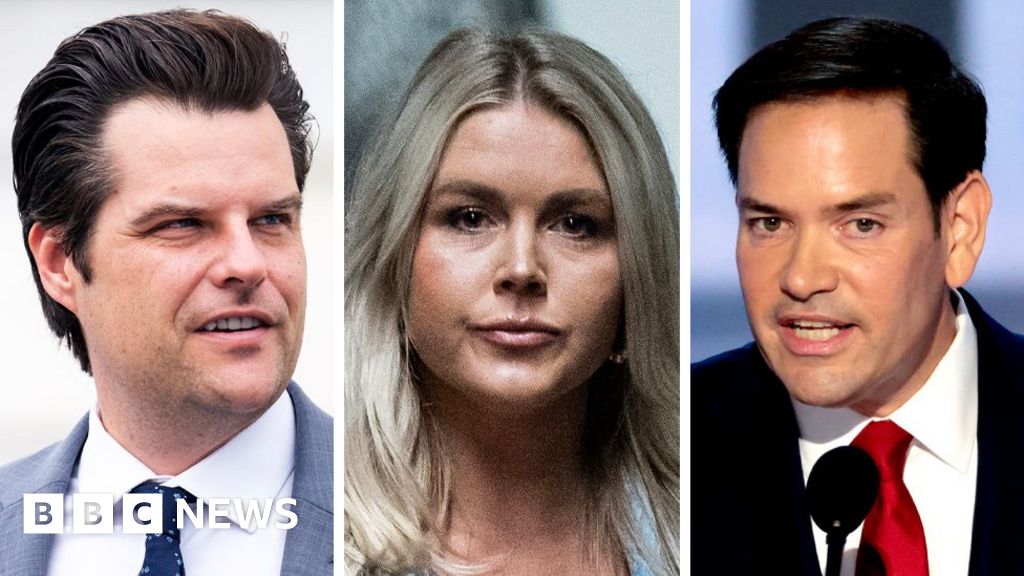
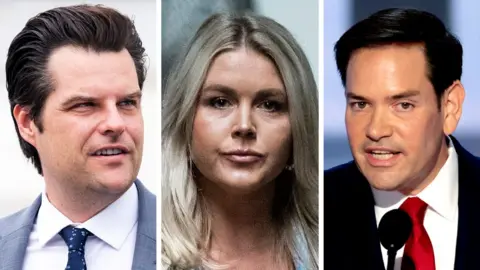 Getty Images
Getty ImagesThe new team entrusted with delivering Donald Trump’s agenda is taking shape, with several contentious hires in his new administration.
Ahead of his return to the White House on 20 January 2025, the president-elect named Florida congressman Matt Gaetz as his nominee for attorney general.
He has named Pete Hegseth, a Fox News host and military veteran, as his pick for defence secretary. And he wants RFK Jr to be health secretary.
On Sunday night he said he wants Big Tech critic Brendan Carr to head the regulatory agency, the Federal Communications Commission.
Marco Rubio could be the next secretary of state. And billionaire supporter Elon Musk will play a role in cost-cutting.
Here is a closer look at the posts he’s named replacements for, and the names in the mix for the top jobs yet to be filled.
We will start with the cabinet roles – these require approval from the Senate. If four Republican senators and all the Democrats disagree to any individual then that nomination will fail.
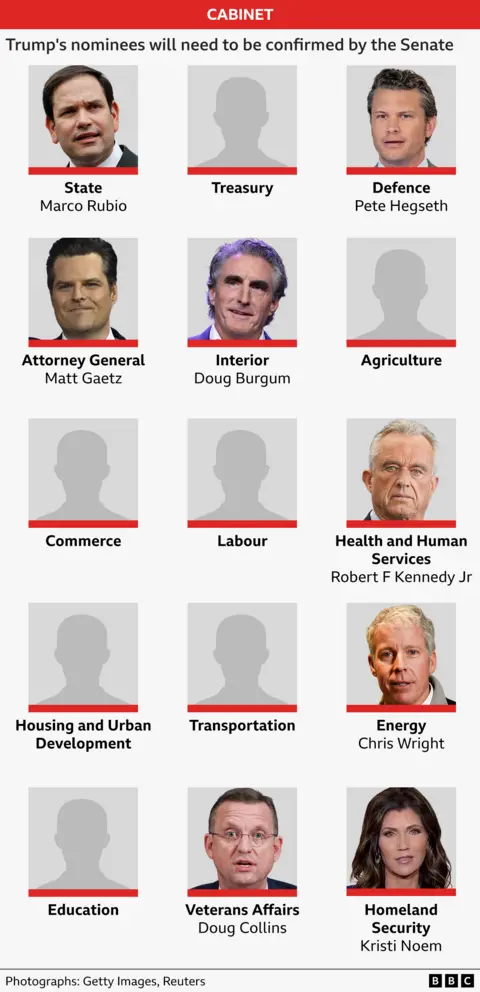
Secretary of state – Marco Rubio
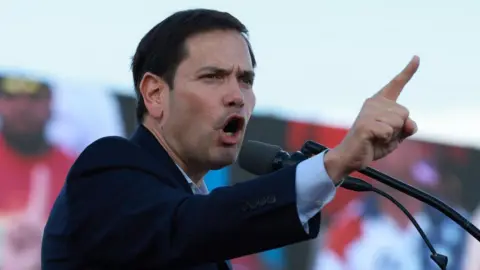 Getty Images
Getty ImagesFlorida Senator Marco Rubio has been picked for US secretary of state, the president’s main adviser on foreign affairs who acts as America’s top diplomat when representing the country overseas.
Rubio, 53, takes a hawkish view of China. He opposed Trump in the 2016 Republican primary but has since mended fences.
He has long been courting the job of the nation’s top diplomat and if approved, he will be the first Latino secretary of state in US history.
Defense secretary – Pete Hegseth
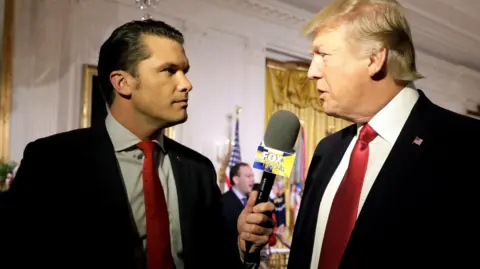 Reuters
ReutersPete Hegseth, a veteran and Fox News host who has never held political office, has been nominated to be the next defence secretary.
His appointment is one of the most highly anticipated in Trump’s cabinet as the wars in Ukraine and Gaza rage on.
“Nobody fights harder for the troops,” Trump said.
Attorney general – Matt Gaetz
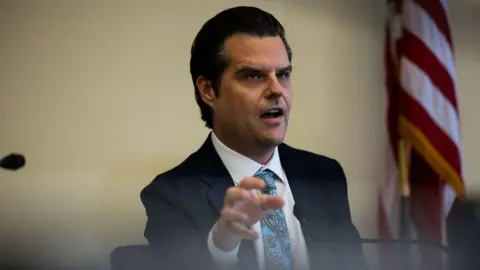 Getty Images
Getty ImagesNo personnel decision may be more critical to the trajectory of Trump’s second term than his appointee to lead the Department of Justice.
After tumultuous relationships with both Jeff Sessions and William Barr, the attorneys general during his first term, Trump was widely expected to pick a loyalist who will wield the agency’s prosecutorial power in the manner of an “attack dog”.
He did just that with Florida congressman Matt Gaetz, whose confirmation is likely to be difficult, as members of both US parties are not fans of him.
Department of the Interior – Doug Burgum
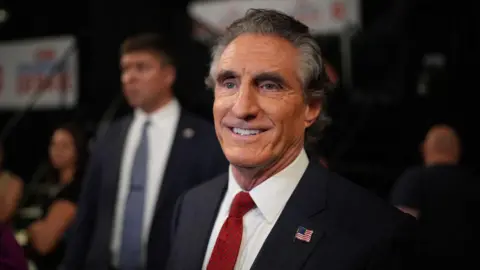 Getty Images
Getty ImagesTrump announced during a speech at Mar-a-Lago that he would ask Doug Burgum, the governor of North Dakota, to lead the Department of the Interior.
A software entrepreneur who sold his small company to Microsoft in 2001, Burgum briefly ran in the 2024 Republican primary before dropping out, endorsing Trump and quickly impressing him with his low-drama persona and sizeable wealth.
If confirmed, Burgum will oversee an agency that is responsible for the management and conservation of federal lands and natural resources.
Health and Human Services – Robert F Kennedy Jr
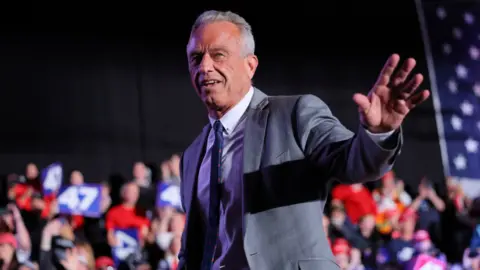 Reuters
ReutersRFK Jr, as he is known, an environmental lawyer, vaccine sceptic and the nephew of former President John F Kennedy, is Trump’s pick to lead the Department of Health and Human Services.
Despite having no medical qualifications, Kennedy, 70, would have broad remit over US federal health agencies – including those that oversee approval of vaccines and pharmaceuticals.
There has been speculation about his inability to pass a background check for security clearance due to past controversies, including dumping a bear carcass in New York’s Central Park.
Veterans’ affairs – Doug Collins
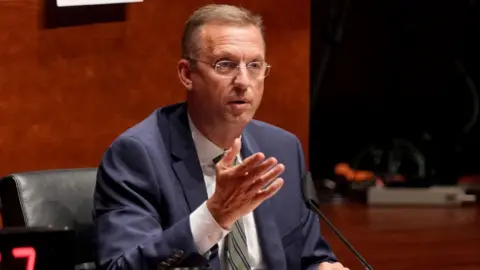 Getty Images
Getty ImagesFormer Georgia congressman Doug Collins has been chosen to lead the US Department of Veterans’ Affairs, Trump announced on his Truth Social platform.
Collins was a Trump loyalist when he served in Congress from 2013-21. He was an outspoken advocate for the president-elect during both impeachment hearings.
An Iraq war veteran who now serves as a chaplain in the US Air Force Reserve, Collins left Congress for an unsuccessful bid for the Senate in his home state of Georgia.
Homeland security – Kristi Noem
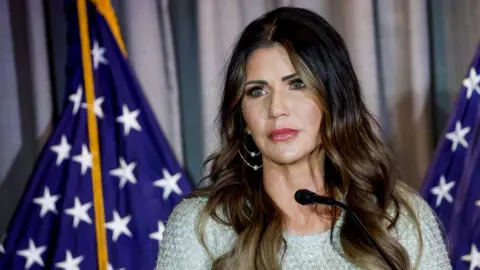 Getty Images
Getty ImagesSouth Dakota Governor Kristi Noem has been nominated for the key role of overseeing US security, including its borders, cyber-threats, terrorism and emergency response.
The agency has a $62bn (£48bn) budget and employs thousands of people. It incorporates a wide variety of agencies under its umbrella, ranging from Customs and Border Protection to the Federal Emergency Management Agency.
Energy – Chris Wright
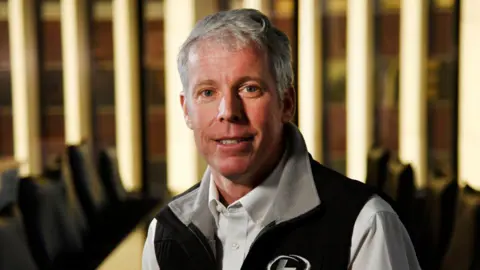 Getty Images
Getty ImagesOil and gas industry executive Chris Wright will lead the Energy Department, where he is expected to fulfill Trump’s campaign promise to “drill, baby, drill” and maximise US energy production.
Wright, the founder-CEO of Liberty Energy, has called climate activists alarmist and likened Democrats’ push for renewables to Soviet-style communism.
In a video posted to his LinkedIn profile last year, he said: “There is no climate crisis, and we’re not in the midst of an energy transition either.”
Commerce secretary
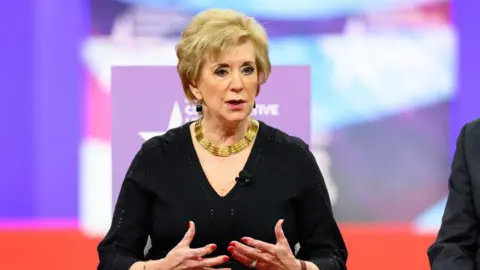 Getty Images
Getty ImagesThe woman co-chairing Trump’s transition team, Linda McMahon, is tipped as a key contender to represent US businesses and job creation in his cabinet – after previously serving as small business administrator during his first term.
Others who could fill this vacancy include Brooke Rollins; Robert Lighthizer; and Kelly Loeffler, a wealthy businesswoman who briefly served in the US Senate.
Treasury secretary
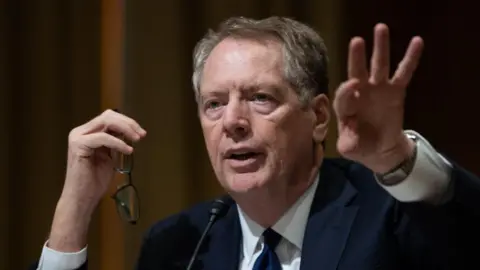 Getty Images
Getty ImagesTrump is reportedly considering Robert Lighthizer, a free trade sceptic who led the tariff war with China as the US trade representative, as his chief financial officer.
But at least four others may be under consideration for the role, including Scott Bessent, a billionaire hedge fund manager who has become a major fundraiser and economic adviser to the president-elect; John Paulson, another megadonor from the hedge fund world; former Securities and Exchange Commission (SEC) chair Jay Clayton; and Fox Business Network financial commentator Larry Kudlow, who ran Trump’s national economic council during his first term.

Outside of the 15 department heads who make up the core of the cabinet, there are several other roles that are often given cabinet-rank, like the FBI director and the head of the Environment Protection Agency.
These roles will also require the nominees to be confirmed by the Senate.
However, there will be other key roles in the Trump administration that will not require Senate confirmation and the people filling these roles (like Elon Musk) will not have to be vetted in the same way.
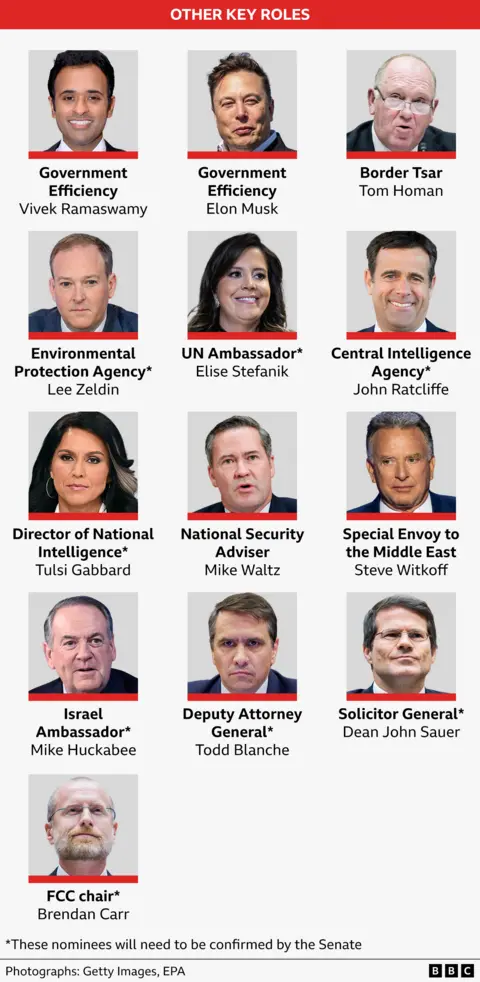
Department of Government Efficiency – Elon Musk & Vivek Ramaswamy
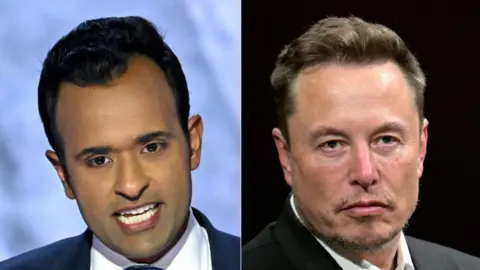 Getty Images
Getty ImagesBillionaire entrepreneur Elon Musk, the world’s richest man, has been tapped to lead what Trump has termed a Department of Government Efficiency (Doge) alongside one-time presidential hopeful Vivek Ramaswamy.
The department – known as “Doge” in a nod to a cryptocurrency promoted by Musk – will serve in an advisory capacity to “dismantle government bureaucracy, slash excess regulations, cut wasteful expenditures and restructure federal agencies”, Trump said.
It is unclear what approval process will be necessary for these roles.
Border Tsar – Tom Homan
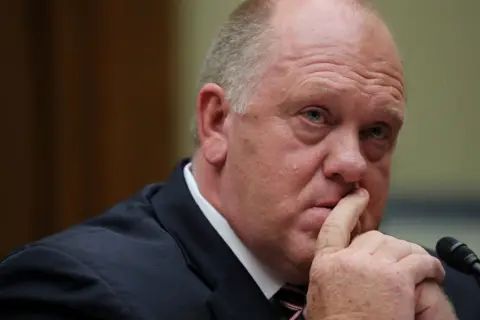 Reuters
ReutersThis is a critical job because it includes responsibility for Trump’s mass deportations of millions of undocumented migrants, which was a central campaign pledge.
Homan is a former police officer who was acting director of the US Immigration and Customs Enforcement (Ice) in Trump’s first term and has advocated a zero-tolerance stance on the issue.
“I will run the biggest deportation force this country has ever seen,” he said in July.
Head of Environmental Protection Agency – Lee Zeldin
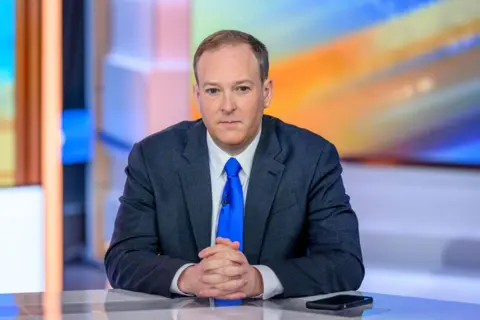 Getty Images
Getty ImagesLee Zeldin, a former New York congressman, has agreed to lead the Environmental Protection Agency, both he and Trump said. The Senate will still need to confirm his appointment.
He will be in charge of tackling America’s climate policy in this role.
While serving in congress from 2015 to 2023, Zeldin voted against expanding a number of environmental policies. He has already said he plans to “roll back regulations” from day one.
United Nations ambassador – Elise Stefanik
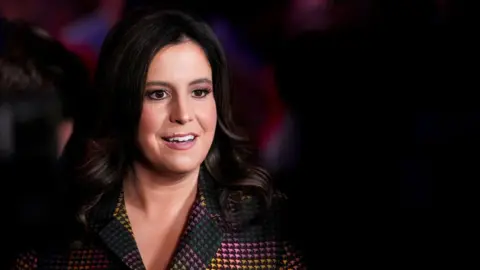 Getty Images
Getty ImagesNew York Congresswoman Elise Stefanik has been tapped to serve as the US ambassador to the United Nations.
Stefanik has made national headlines with her sharp questioning in congressional committees.
Certain political appointments in the US – including the UN ambassador job – require the approval of the US Senate. But Trump has demanded that the next Senate leader let him make appointments without traditional confirmation votes.
Intelligence/national security posts
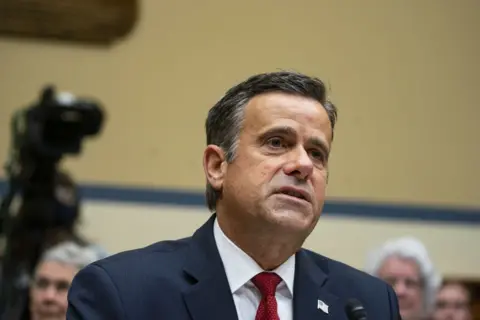 Getty Images
Getty ImagesTrump has chosen his former director of national intelligence, ex-Texas congressman John Ratcliffe, to serve as Central Intelligence Agency (CIA) director.
There are other yet-to-be-appointed key positions running intelligence agencies, including the FBI and director of national intelligence.
Trump has said he would fire FBI Director Chris Wray, whom he nominated in 2017, but has since fallen out with. Jeffrey Jensen, a former Trump-appointed US attorney, has been under consideration to replace Wray.
Director of national intelligence – Tulsi Gabbard
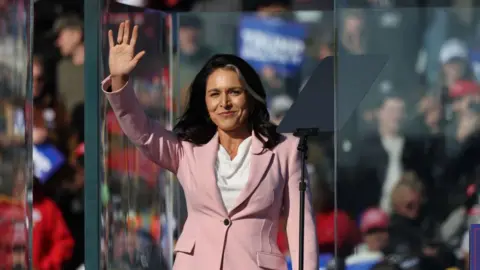 Getty Images
Getty ImagesTrump has named former Democratic congresswoman from Hawaii, Tulsi Gabbard, as director of national intelligence.
The former US Army Reserve officer once campaigned with Senator Bernie Sanders and ran for president as a Democrat in 2020, but has turned toward the Republicans in recent years.
She campaigned with Trump in 2024 and served on his transition team.
National security adviser – Mike Waltz
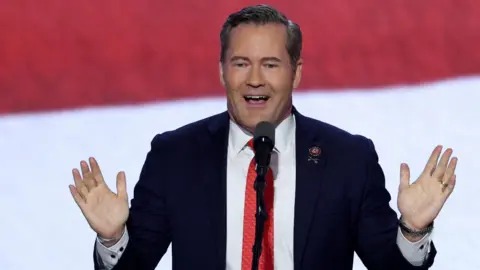 Reuters
ReutersFlorida congressman Michael Waltz has been selected by President-elect Donald Trump as the next national security adviser.
In a statement on Tuesday announcing Waltz’s appointment, Trump noted that Waltz is the first Green Beret – or member of the US Army Special Forces – to be elected to Congress.
Waltz will have to help navigate the US position on the wars in Israel, and in Ukraine and Russia.
Special envoy to the Middle East – Steve Witkoff
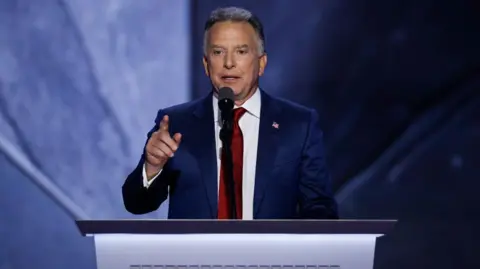 Getty Images
Getty ImagesTrump has picked real estate investor and philanthropist Steve Witkoff for the role of special envoy to the Middle East.
Witkoff is a close friend of Trump’s who was with the former president when a man allegedly tried to assassinate him at his Palm Beach golf club in September.
Trump has described him as a “highly respected leader in business and philanthropy, who has made every project and community he has been involved with stronger and more prosperous”.
US ambassador to Israel – Mike Huckabee
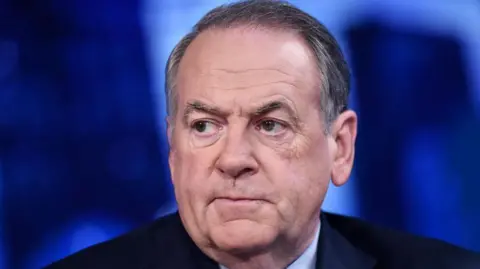 Getty Images
Getty ImagesFormer Arkansas Governor Mike Huckabee will be US ambassador to Israel, as Trump pledges to end the ongoing conflict in the Middle East.
“Mike has been a great public servant, governor, and leader in faith for many years,” the president-elect said in a statement.
Huckabee is a staunchly pro-Israel official who has previously rejected the idea of a two-state solution to solve the Israel-Palestinian conflict.
Solicitor General – Dean John Sauer
Trump selected Dean John Sauer to be US solicitor general to supervise and conduct government litigation in the US Supreme Court.
Sauer previously served as solicitor general for the Missouri state Supreme Court for six years and worked as a clerk for former US Supreme Court Justice Antonin Scalia.
Sauer represented Trump earlier this year in several of his court cases, including his US Supreme Court immunity case.
Federal Communications Commission chair – Brendan Carr
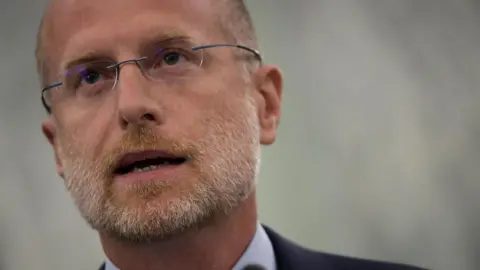 Reuters
ReutersBrendan Carr is a current member of the Federal Communications Commission (FCC), which regulates broadcast and internet use. A longtime establishment Republican, in recent years he has embraced Trump’s priorities and emerged as a supporter of regulation of Big Tech.
“Facebook, Google, Apple, Microsoft and others have played central roles in the censorship cartel,” he wrote on X. “The censorship cartel must be dismantled.”
Trump has previously vowed to strip TV channels he considers biased of their broadcasting licenses.

These jobs are in the West Wing – his key advisers.
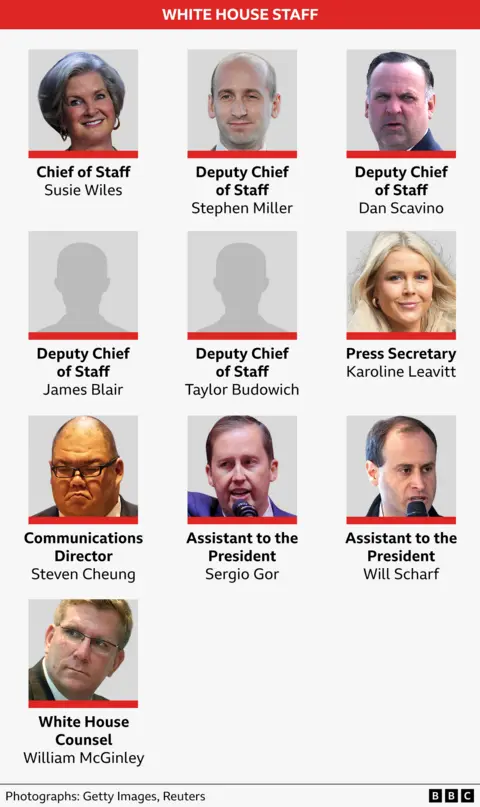
Chief of staff – Susie Wiles
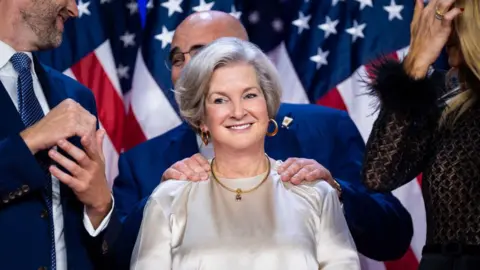 Getty Images
Getty ImagesSusie Wiles and campaign co-chair Chris LaCivita were the masterminds behind Trump’s victory over Kamala Harris.
The chief of staff is a cabinet member and often a president’s top aide, overseeing daily operations in the West Wing and managing the boss’s staff.
Wiles, 67, has worked in Republican politics for decades, from Ronald Reagan’s successful 1980 presidential campaign to electing Rick Scott and Ron DeSantis as governors of Florida.
Deputy chief of staff – Stephen Miller
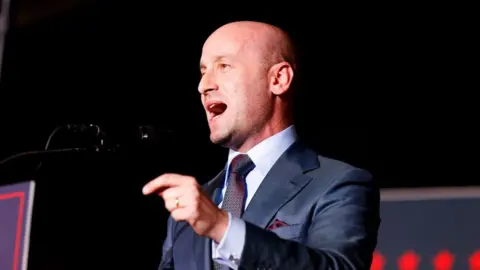 Getty Images
Getty ImagesStephen Miller, who has been Trump’s close adviser and speechwriter since 2015, is Trump’s choice for White House deputy chief of staff for policy.
He will likely shape any plans for mass deportations – and pare back both undocumented and legal immigration.
During Trump’s first term, Miller was involved in developing some of the administration’s strictest immigration policies.
White House counsel – William McGinley
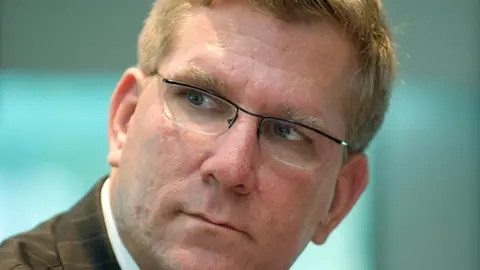 Getty Images
Getty ImagesRepublican lawyer William McGinley will take on the role of White House counsel, Trump has said.
“Bill is a smart and tenacious lawyer who will help me advance our America First agenda while fighting for election integrity and against the weaponization of law enforcement,” he said in a statement.
McGinley served as White House cabinet secretary during part of Trump’s first term and was the Republican National Committee’s counsel for election integrity in 2024.
Press secretary – Karoline Leavitt
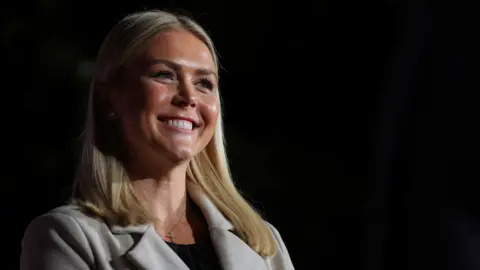 Reuters
ReutersKaroline Leavitt, 27, will become the youngest person to serve as White House press secretary in US history when Donald Trump returns to office.
She ran for Congress, winning the Republican nomination for New Hampshire in 2022, only to lose in the general election to Democrat Chris Pappas.
Leavitt also served in the White House press office during the first Trump administration, including as an assistant press secretary, according to the website for her run for Congress.
The public will soon see Leavitt in the iconic spot behind the podium in the White House briefing room – a space that led to countless tense exchanges between members of the press and officials in Trump’s first administration.
Communications director – Steven Cheung
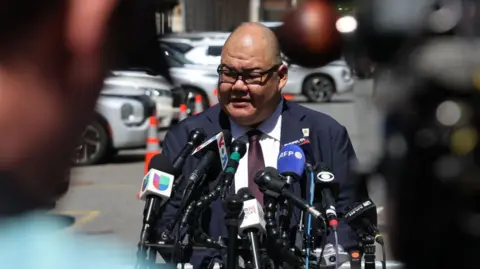 Getty Images
Getty ImagesSteven Cheung joined Trump’s team in 2016 as his campaign spokesman, and will soon take on a top communications role in the White House.
Raised by Chinese immigrant parents in California, Cheung started out as an intern under then-California Governor Arnold Schwarzenegger. He has also been the spokesman for the Ultimate Fighting Championship (UFC).
Cheung became known for his fierce, and often offensive, attacks towards Trump’s opponents. He has said Joe Biden “slowly shuffles around like he has a full diaper in his pants” and Florida Governor Ron DeSantis walks like a girl who “discovered heels for the first time.”
During his first administration, Trump had an unusually high turnover of communications directors – six different people. Anthony Scaramucci infamously only lasted 11 days in the role.
Assistant to the President – Sergio Gor
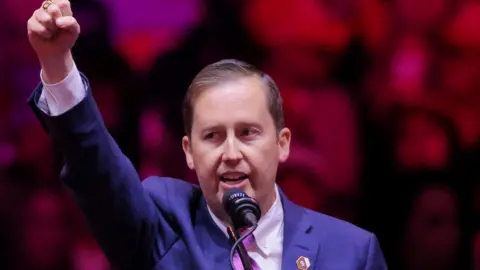 Reuters
ReutersSergio Gor is a business partner of Donald Trump Jr. He is the president and co-founder of the younger Trump’s publishing company, Winning Team Publishing, which has published a book by the president-elect.
“Steven Cheung and Sergio Gor have been trusted advisers since my first presidential campaign in 2016, and have continued to champion America First principles,” Trump said in a statement.








